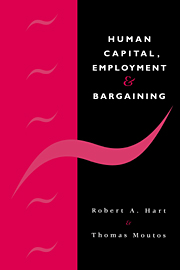Book contents
- Frontmatter
- Contents
- Preface
- 1 Overview
- 2 Labour demand and efficient contract models
- 3 Turnover costs, firm-specific training and unemployment
- 4 Employment and bargaining
- 5 Choice of compensation, unemployment insurance and policy issues
- 6 Team-related human capital and bargaining
- 7 Coalitional versus neoclassical firms
- 8 Future developments
- Bibliography
- Index
5 - Choice of compensation, unemployment insurance and policy issues
Published online by Cambridge University Press: 05 November 2011
- Frontmatter
- Contents
- Preface
- 1 Overview
- 2 Labour demand and efficient contract models
- 3 Turnover costs, firm-specific training and unemployment
- 4 Employment and bargaining
- 5 Choice of compensation, unemployment insurance and policy issues
- 6 Team-related human capital and bargaining
- 7 Coalitional versus neoclassical firms
- 8 Future developments
- Bibliography
- Index
Summary
Context of chapter developments
Before attempting to extend the analysis of human capital to embrace bargaining models, we concentrate in this chapter on some extensions of the generalised Nash bargaining solution concept as stated in (4.13). These developments serve as a bridge between several of the labour demand topics discussed in chapter 2 and the expanded bargaining models of chapters 6 and 7.
Looking backwards, for example, we revisit the earlier labour demand comparison of pure wage and profit-sharing contracts (see section 2.3.3) by examining these forms of compensation within a bargaining perspective. When we extend the bargaining models to include taxes on the firm and its workers, labour market effects of changes in payroll taxes feature prominently as before. In this chapter, however, we concentrate on a different labour market aspect of payroll taxes, viz. their potential influence on the choice of compensation system. Our earlier analysis of the employment implications of changes in unemployment benefits and funding – within the efficient contract model of section 2.4 – is extended by distinguishing among differing types of unemployment schemes. Also, in line with a dominant theme throughout chapter 2, we integrate the role of working time into several of our bargaining topics.
Looking ahead, our analyses of efficient bargains link directly to the first part of chapter 6 and to chapter 7 where the generalised Nash bargaining solution concept is the dominant modelling approach in our bargaining models that include human capital.
- Type
- Chapter
- Information
- Human Capital, Employment and Bargaining , pp. 96 - 129Publisher: Cambridge University PressPrint publication year: 1995



